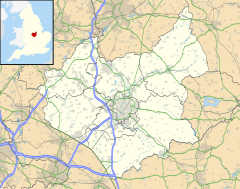Anstey, Leicestershire
| Anstey | |
|---|---|
 'Anstey - Gateway to Charnwood Forest' sign seen on entering the village |
|
| Anstey shown within Leicestershire | |
| Area | 6.25 sq mi (16.2 km2) |
| Population | 6,528 (2011 Census) |
| • Density | 1,044/sq mi (403/km2) |
| OS grid reference | SK545085 |
| District | |
| Shire county | |
| Region | |
| Country | England |
| Sovereign state | United Kingdom |
| Post town | LEICESTER |
| Postcode district | LE7 |
| Dialling code | 0116 |
| Police | Leicestershire |
| Fire | Leicestershire |
| Ambulance | East Midlands |
| EU Parliament | East Midlands |
| UK Parliament | |
Anstey is a large village in Leicestershire, England, located north west of Leicester in the borough of Charnwood. Its population was 6,528 at the 2011 census. This figure is expected to increase due to the building of a new housing development off Groby Road. The village is separated from Leicester by the Rothley Brook, Castle Hill Park and the A46, and it borders the villages of Glenfield, Groby, Newtown Linford, Cropston and Thurcaston as well as the suburb of Beaumont Leys and Anstey Heights. To the north-west lies Bradgate Park.
Anstey is known as the Gateway to Charnwood Forest. It is a combination of traditional English village (with two village greens - the top green and bottom green) and an industrial town (with several 19th-century hosiery factories, many of which are now being turned into apartments) which is made up mostly of a number of small estates, both council and private which are intertwined, often with no clear border.
Anstey dates back to Angle origins, when it was known as Hanstige (later Anstige), meaning a narrow forest track (specifically the meaning is either 'one-way' or 'steep road'). Anstey was positioned between Charnwood Forest and Leicester Forest.
Whilst developing the site for the new Co-op store in 2002 archaeologists were called in and found remains dating back to the 12th century. A plaque recording this has been placed on the wall of the new shop.
The place-name of Anstey is first recorded in Domesday Book when it was held by one of the county's largest landholders, Hugh de Grandmesnil, castellan of Leicester. At the time it was a small farming community.
...
Wikipedia

